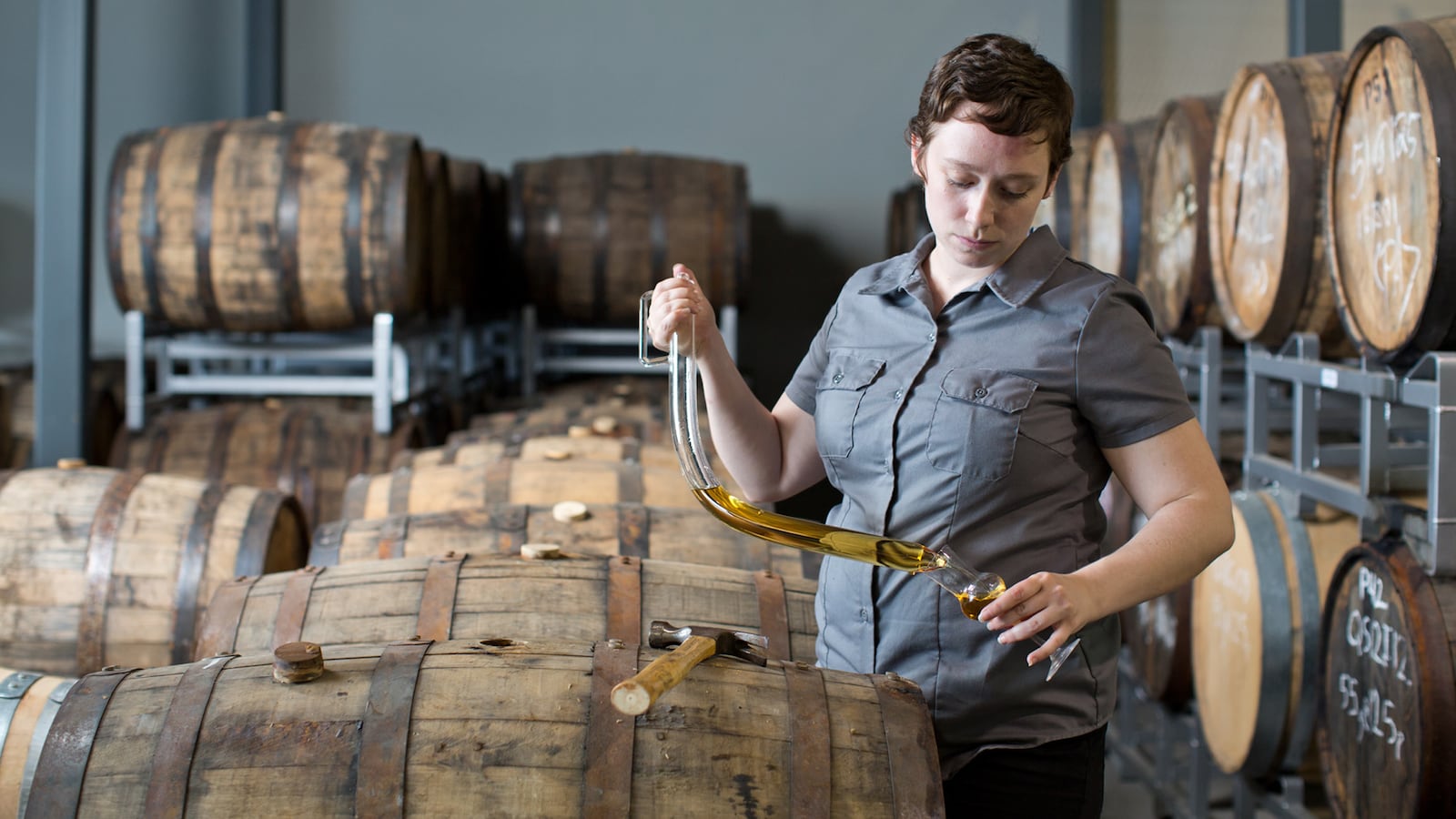Maggie Campbell is truly a distiller’s distiller. Thanks to her unrelenting commitment to using only high-quality ingredients and old-school techniques, Campbell’s Privateer Rum, which is based in Ipswich, Massachusetts, has developed a cult-like following among bartenders, journalists and fans of craft spirits.
If you didn’t get a bottle of her acclaimed Bottled-in-Bond Navy Yard Rum, don’t worry! Starting this year it will become a standard part of the line under the name New England Bottled-in-Bond. Also, look out for this year’s special releases: L’Alliance Cognac cask-finished rum and Laphroaig cask-finished Sea Smoke #2.
Campbell is also vice president of the American Craft Spirits Association, and has embraced a leadership role in the industry. She frequently speaks around the world at conventions to share her perspective and experience on everything from molasses and yeast to mental health and racial and gender equality.
But Campbell didn’t always want to be a rum distiller. In fact, this all happened quite by accident. Read on to find out how she landed at Privateer, what her daily schedule is like and how she deals with a hectic travel schedule.
What did you want to be when you were growing up? “I really wanted to be a stunt person. That was really important to me. Maybe it was growing up in L.A., like you definitely have friends and family and people you know in the industry in different ways. Like, ‘Oh, so and so did a shampoo commercial or whatever.’ Even as a little girl, I was really into the idea of being a stunt person up until I was a teen. And I did actually really want to be a farmer. I remember telling my sister, I’m going to have a farm and we’re going to live on a farm together. She was like, ‘I’m not living on a farm.’”
How did you get into distilling? “When I was 20, I [had a] job selling wine and fine spirits. I just kind of realized I had an ability to talk about spirits in a way that a lot of my peers at the same business didn’t. It was a very competitive, kind of a macho environment, so I was like, well, I’m going to learn everything I can about it. I started talking to distillers and trying different spirits and I learned more and got better. There was a lot of motivation for me to continue and I had access to it because I was in Denver, Colorado. I got to know and try the Leopold Bros. spirits and I got to know the guys at Stranahan’s when they were first starting out. This was a time when there weren’t a ton of distilleries, so I could really sit down and ask them questions.
By this time I was 22 or 23. I was still working in the wine shop, and I realized I couldn’t really learn that much about Cognac if I wasn’t in Cognac. It’s very quiet and closed-door, so I messaged Germain-Robin like, ‘Hey, I’m looking for a book [on Cognac], can you recommend anything?’ They wrote me back very honestly, like, ‘No, that’s not really available, [but] we’re hiring for an assistant distiller and you have a background in wine. Half of distilling brandy or Cognac is making wine—do have interest in coming out and meeting us?’ So it was really just a huge accident. When I started [at Germain-Robin] in 2009, I was 24 or 25. I thought I’d be lucky to keep an assistant job and make enough to keep a tiny apartment. I did not know the industry was going to have that third wave distillers explosion.”
When did you start at Privateer? “After almost a year at Germain-Robin, I went and worked for a distributor. About a year-and-a-half later, it was actually Germain Robin who called me and he had met the founder of Privateer. He was like, ‘This is where you’re supposed to be.’ Andrew Cabot had shared with him his vision to make rum with best practices, minimal intervention and not using fake flavoring, coloring or additives.”
Did you always want to make rum? “When I began, it was very much, ‘I’m going to own a rye whiskey distillery.’ In 2004, I had my first version of my business plan. I worked at this distributor Volio and my husband and I traveled with Dave Pickerell a little bit to open a rye whiskey distillery. It was a pivot for me to be like, ‘I’m going to be part of founding a rum distillery.’ That’s not something I do for two years—that’s something I do for 10 years. As soon as I met Andrew, I was like, ‘Okay, this is what we’re doing now.’
The whiskey world was a little bit difficult for me. I think it's progressed a lot, but I was not treated well a lot of the time and not taken seriously. By shifting to rum, I found my dream job. There are also so many incredible women at the tip top positions of so many rum companies that it just was a zero issue. I was just treated differently by fans, by authors, by peers and it was so much more comfortable. I just needed to be open to that shift.”

What is your typical daily routine at Privateer? “I kind of have two separate routines. There’s the routine when I’m in town working at the distillery. I usually go in around nine, and it’s a lot of checking in with production. Where’s everything at? What are we making? What’s our barrel inventory? Where do we need to make more? We’re kind of adjusting the schedule based on the feedback we’re getting. Our Bottled-in-Bond sold out instantly, let’s increase the four-year-old layback program—stuff like that. Then, what needs to be repaired, what needs to be ordered, answering technical questions. There’s a lot of tasting, a lot of confirming. My team is very strict that they want me to run the still a certain number of times very regularly to stay a member of the distilling team for them. It’s really helpful that I am running all the equipment alongside them regularly, so that if something breaks or something happens, I know where things are at, I know what’s going on. When they call me and they say, ‘Oh, this pump is acting up,’ I know exactly how important that is and get it fixed right away.
I’m also always working with the sales team on how things are going, what’s the feedback they’re getting, what the buzz topics they’re hearing about and what ideas they have for projects or events.
Then, there’s a businessy side of it—new products coming out with label design and how are we feeling about developing this new type of rum? I’m talking to distributors across the country about where things are at, what questions do they have, are we doing any events, am I going to visit a market? And then making sure all the tax paperwork, federal filing, all the distillery numbers are recorded. So that Andrew, our CEO and our accountant and everyone has everything they need to file the federal paperwork. So, a lot of boring stuff.”
What are some of the biggest misconceptions about being a distiller that you encounter? “There are a lot of people who get their first job and it’s not what they think. And it’s funny, I see that now so much with younger distillers who are just getting started. They don’t think about the fact that 90-percent of your life is talking to distributors and customers, and filling out tax paperwork and then the rest is cleaning.
I’m so lucky that this was like my first career and there wasn’t this big imaginary vision of what a distiller was when I started. It’s not just like playing around with copper all day—although that’s the fun, very rewarding part.”
You’re very outspoken about healthy living. How do you keep yourself feeling balanced when you’re on the road so much? “I get a lot of energy out of going to a new place and connecting with new people. Education is something that gives me a lot of energy. But I also do get sensory overwhelmed sometimes. If I’m at a convention, like Tales of the Cocktail, and it’s 10 PM and I’ve been up and talking to people all day, I can be very overstimulated and like the kill switch is just there for me. It’s balancing both. I’m very good at going to bed—I don’t need to be out that late.
As a distiller, I’m really aware of how much alcohol I’m exposed to and I really don’t drink that much. So, I think that makes life on the road easier. When I’m out and about, club soda and bitters is my savior. I might have a drink because I want to see what’s out there, and then I’ll have another club soda and bitters. I really like to alternate. I’ll maybe have two drinks in a night. For me, it’s important that [a healthy relationship with alcohol] is really integrated into my life.
There’s definitely times where I’m willing to travel a lot, but there are periods in the year already blocked out for 2020 on my calendar, longer stretches of time, where I’m not traveling.”
How do you like drinking rum when you’re not tasting at the distillery? “For me, when I drink at home, I drink a lot of Rum Boulevardiers. Aged rum, for me, is what makes it a Boulevardier as opposed to like a Rum Negroni, which would be white rum or something. I [also] love a good Highball.”
What excites you the most about your distilling work right now? “We have a couple experiments coming down the line that I’m really excited about. I always find the word experiments a very loaded word because it could mean a lot of gimmicky crap. But I feel like we have some really elegant experiments that I’m really excited about that will just coax out some unique flavors and make some cool expressions. We’re going to try doing some single distillation and see how that comes out and see if we like it or if we don’t.”
A Day in the Life features the daily routines and career paths of bartenders, chefs, distillers and brand ambassadors.
Interview has been condensed and edited.

